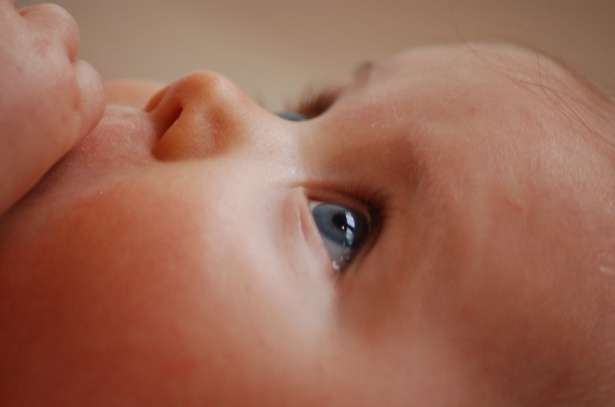Credit: axelle b/public domain
(Medical Xpress)—A trio of researchers with PSL Research University in France has found evidence that suggests human infants develop metacognition at an earlier age than has been found by researchers on other studies. In their paper published in Proceedings of the National Academy of Sciences, the trio describe the study they carried out and why they believe their results show that toddlers have the ability to communicate uncertainty to others.
Humans have been found to have a variety of different mental abilities compared to the rest of the animal kingdom, one of which is metacognition—where an individual not only experiences uncertainty, but possesses an ability to convey that uncertainty to others. It is very common in adults, but scientists have not been able to pinpoint when it first develops—some have suggested it does not appear until babies develop into children. In this new effort, the researchers suggest the results of their study show that it occurs by the time a baby is just 20 months old.
The experiments the researchers conducted were simple, 20 month old toddlers were put in a room and shown a researcher hiding a toy in one of two bins—one of the bins was easy to see, the other was hidden behind a curtain. The toddlers were then asked to point at the bin which held the toy. The only variable was the amount of time that elapsed between the ball being put into the bin and when the child was asked where it was. The researchers report that approximately half of the toddlers correctly identified which bin held the toy without help from their parent. But, the other half of the toddlers were able to ask for help from their Mom (which was measured by a steady gaze into her eyes).
As expected, the researchers found that increasing the duration of the pause made things harder for the toddlers, as did hiding the toy—both led to more uncertainty. The researchers found that two sets of toddlers responding after a long pause were roughly equal in making the same number of correct choices, but, the group that was able to ask for help made wrong guesses far less often. This, the researchers claim, shows that the toddlers were able to gauge their level of uncertainty and to convey that to a parent who they knew would help them solve the problem.
More information: Louise Goupil et al. Infants ask for help when they know they don't know, Proceedings of the National Academy of Sciences (2016). DOI: 10.1073/pnas.1515129113
Abstract
Uncertainty monitoring is a core property of metacognition, allowing individuals to adapt their decision-making strategies depending on the state of their knowledge. Although it has been argued that other animals share these metacognitive abilities, only humans seem to possess the ability to explicitly communicate their own uncertainty to others. It remains unknown whether this capacity is present early in development, or whether it emerges later with the ability to verbally report one's own mental states. Here, using a nonverbal memory-monitoring paradigm, we show that 20-month-olds can monitor and report their own uncertainty. Infants had to remember the location of a hidden toy before pointing to indicate where they wanted to recover it. In an experimental group, infants were given the possibility to ask for help through nonverbal communication when they had forgotten the toy location. Compared with a control group in which infants had no other option but to decide by themselves, infants given the opportunity to ask for help used this option strategically to improve their performance. Asking for help was used selectively to avoid making errors and to decline difficult choices. These results demonstrate that infants are able to successfully monitor their own uncertainty and share this information with others to fulfill their goals.
Journal information: Proceedings of the National Academy of Sciences
© 2016 Medical Xpress




















